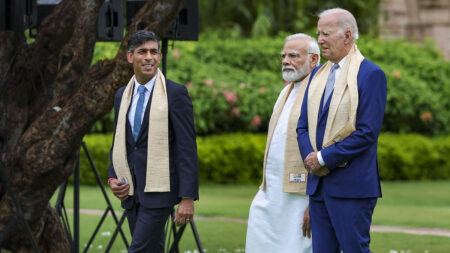As Pakistan’s economy is in the midst of a recurrent economic crisis, its leadership has also come under the threat of losing its power. As goes the history of Pakistan: No Pakistani Prime Minister has ever completed a full five-year term in office.
The current development only inclines the long going trend of Pakistan administration failures. Khan was in charge of a coalition government, but he is now facing a rebellion from approximately two dozen parliamentarians and allies who are hesitant to back him.
Current Developments
On March 8: Opposition parties submitted a no-confidence motion before the National Assembly Secretariat, holding the Pakistan Tehreek-e-Insaaf (PTI) government led by Prime Minister Khan responsible for the economic crisis and inflation in the country.
On March 24: The National Assembly Secretariat had issued a 15-point Orders of the Day for the NA session, which included the no-confidence resolution.
On March 25: Pakistan’s National Assembly on Friday adjourned the session till Monday without tabling the no-confidence session against Prime Minister Imran Khan.
The National Assembly was adjourned owing to the death of Pakistan Tehreek-e-Insaf legislator Khayal Zaman. According to Pakistani parliamentary customs, the first sitting after a lawmaker’s death is confined to prayers for the departed soul and tributes from fellow MPs.
However, the opposition leaders protested against the adjournment of the session. Several prominent opposition leaders including Leader of the Opposition in the National Assembly Shehbaz Sharif, PPP Chairman Bilawal Bhutto-Zardari and PPP co-chair Asif Ali Zardari, were present at the Parliament House in Islamabad. Opposition leader Shehbaz Sharif from the Pakistan Muslim League-Nawaz asserted, “We strongly protest it.”
Pakistan Assembly Composition
The Pakistani National Assembly has a total of 342 members, with 172 constituting a majority. The PTI-led coalition has 179 members, with Imran Khan’s PTI having 155 members and four key allies Muttahida Qaumi Movement-Pakistan (MQM-P), Pakistan Muslim League-Quaid (PML-Q), Balochistan Awami Party (BAP), and Grand Democratic Alliance (GDA) each having seven, five, five, and three members.
The MQM-P, PML-Q, and BAP, Imran Khan’s three allies, have announced their support for the Opposition’s no-confidence resolution and stated that they will vote accordingly. The situation was exacerbated when almost 20 members from Imran Khan’s party had recently sought refuge in the Sindh House in Islamabad, and are expected to vote in favour of the no-confidence motion.
On the other hand, opposition parties in Pakistan have the support of 162 members of parliament and are anticipated to be joined by the three ruling coalition parties during the vote, allowing them to pass the majority mark, with 179 members voting in favour of the no-confidence resolution.
PPP Senator Farhatullah Babar said, “We have the numbers. PTI’s allies will support us on the no-confidence. When the voting takes place, everyone will be surprised. Maybe some ministers will also join us.” Prime Minister Imran Khan had insisted in a statement issued from his office late Wednesday night, “I will not resign come what may.”
Imran Khan is said to have had a falling out with Pakistan‘s powerful military, which many feels played a key role in Imran Khan’s ascension to power. For decades, the military in the neighbouring country has interfered in civilian politics. Mr. Khan and the military, both deny the allegations.
However, in the latest power struggle, the military asserted its neutrality, leaving it to political parties to decide Khan’s fate.Imran Khan’s government is banking on the IMF to deliver the next instalment of a $6 billion rescue package to shore up the country’s dwindling foreign currency reserves. His government’s fate remains in hanging until Monday.
Edited by Subbuthai Padma
Published by Iram Rizvi












